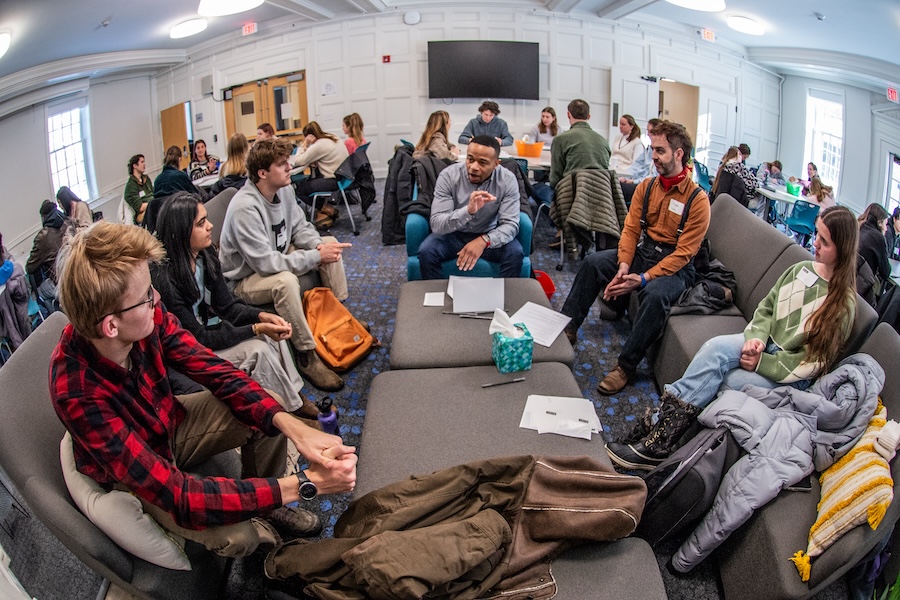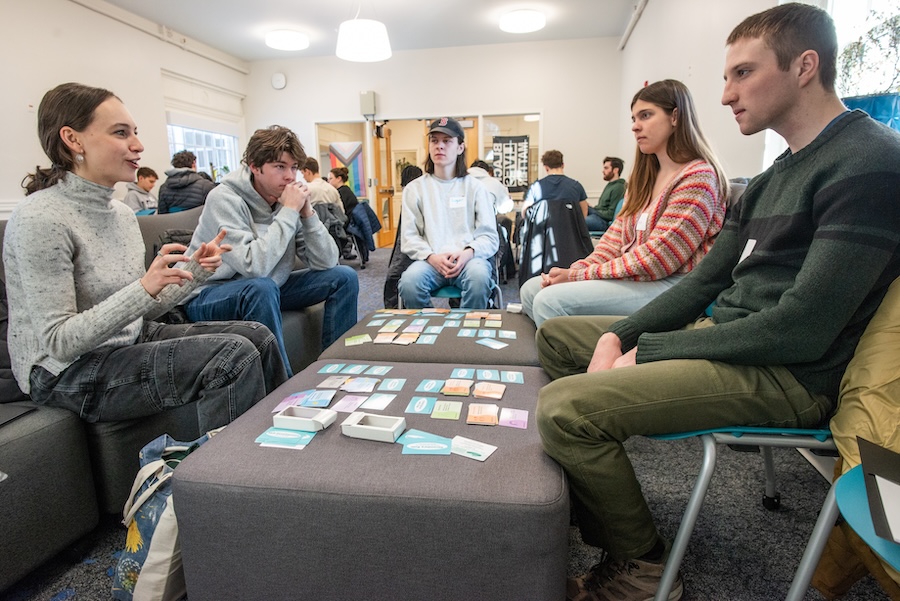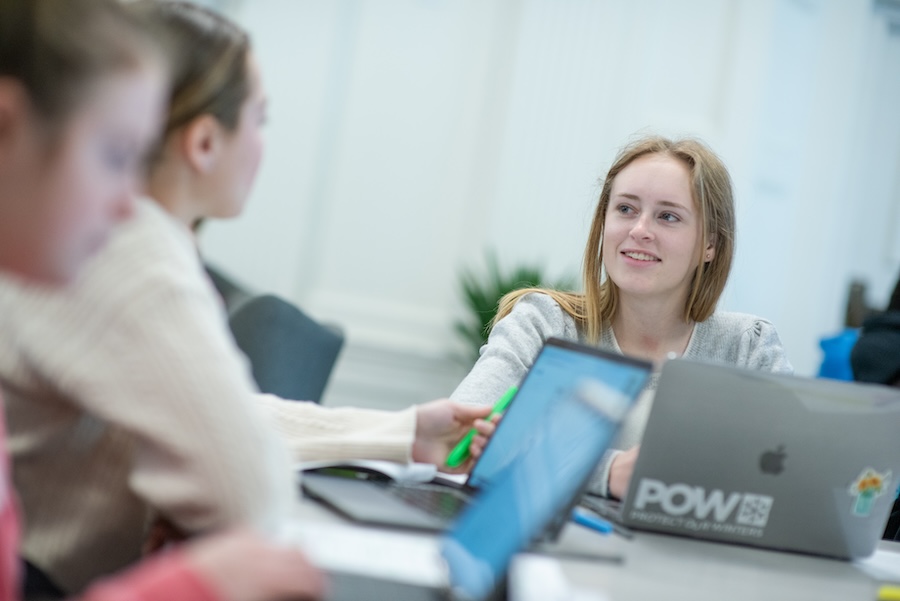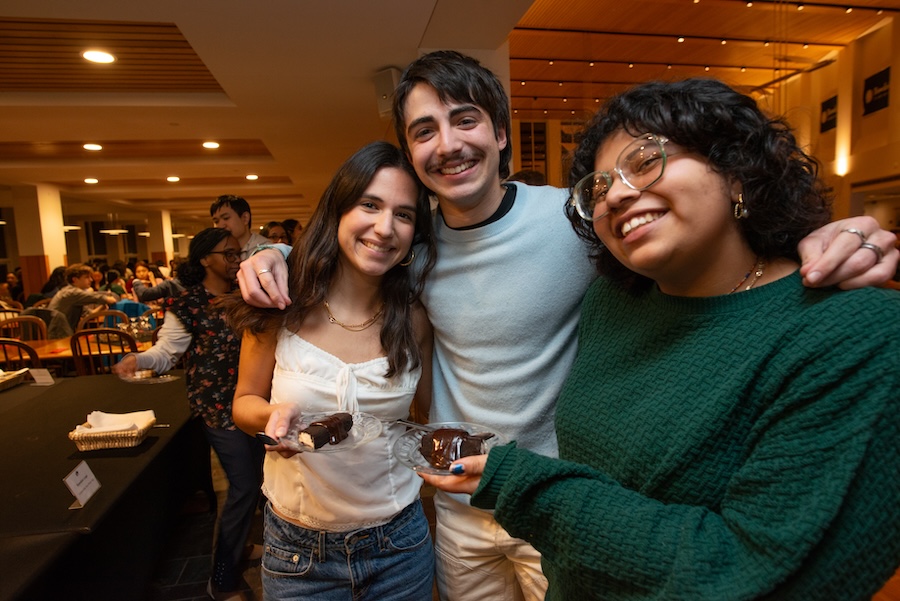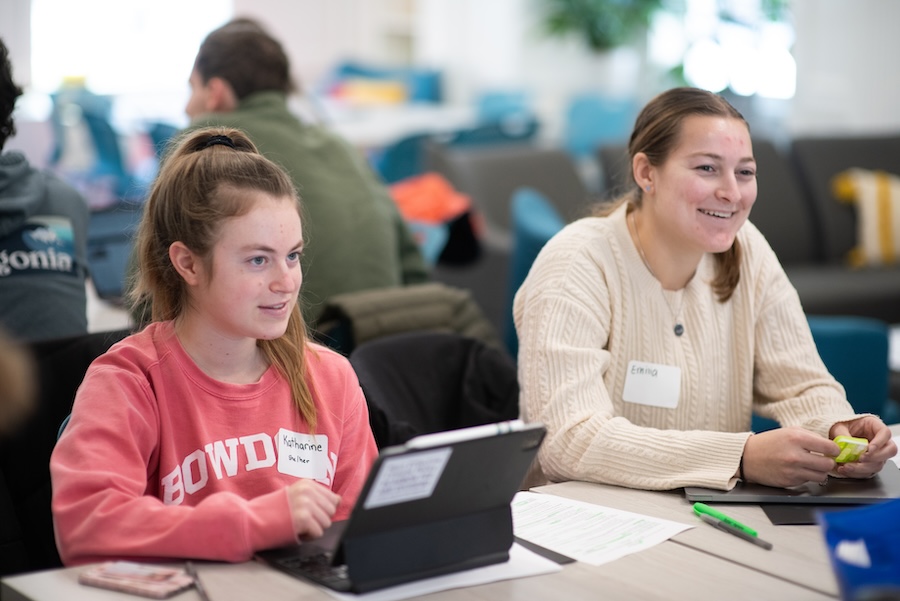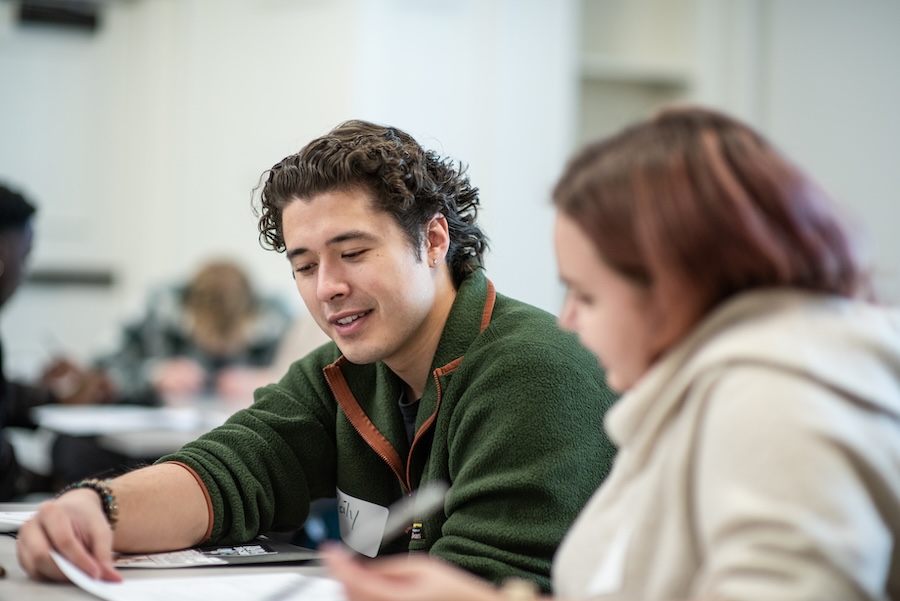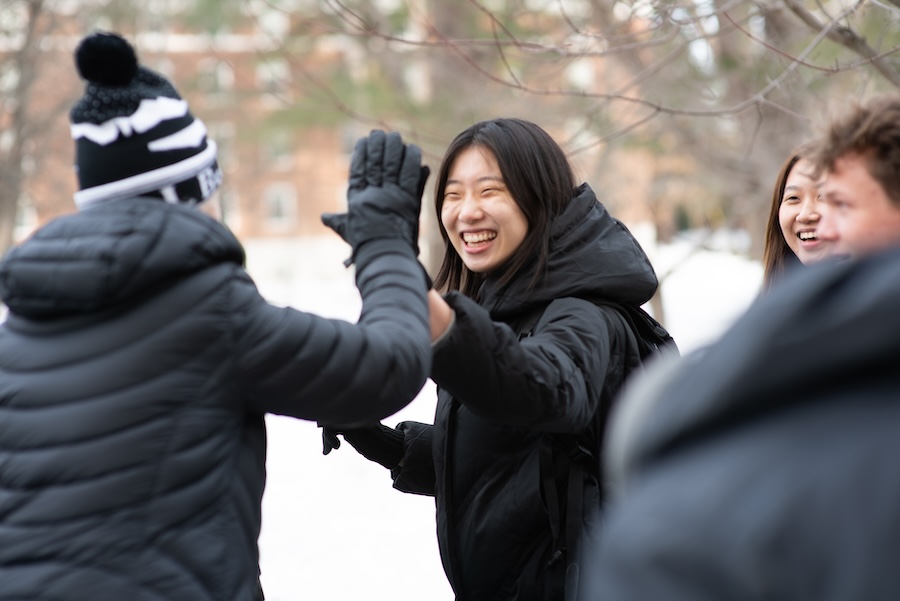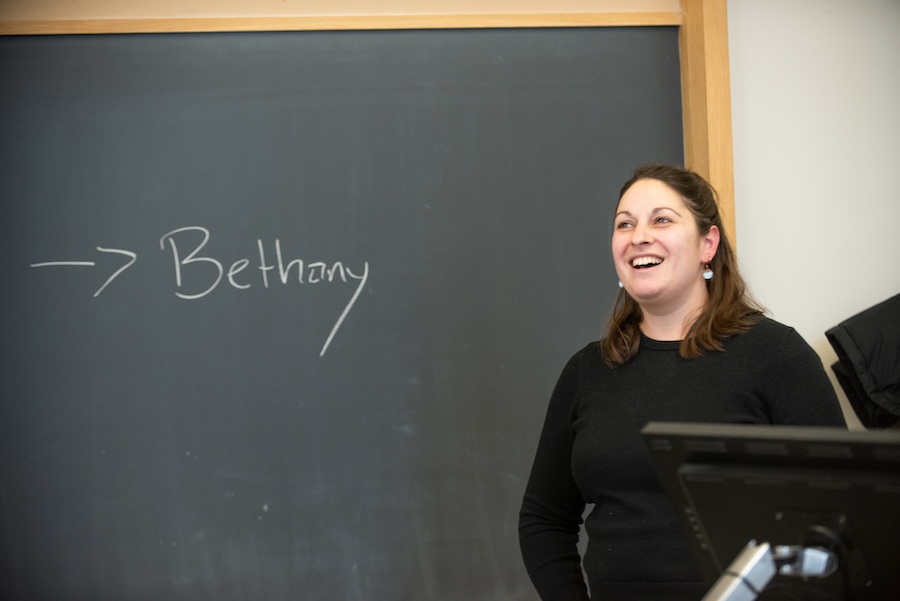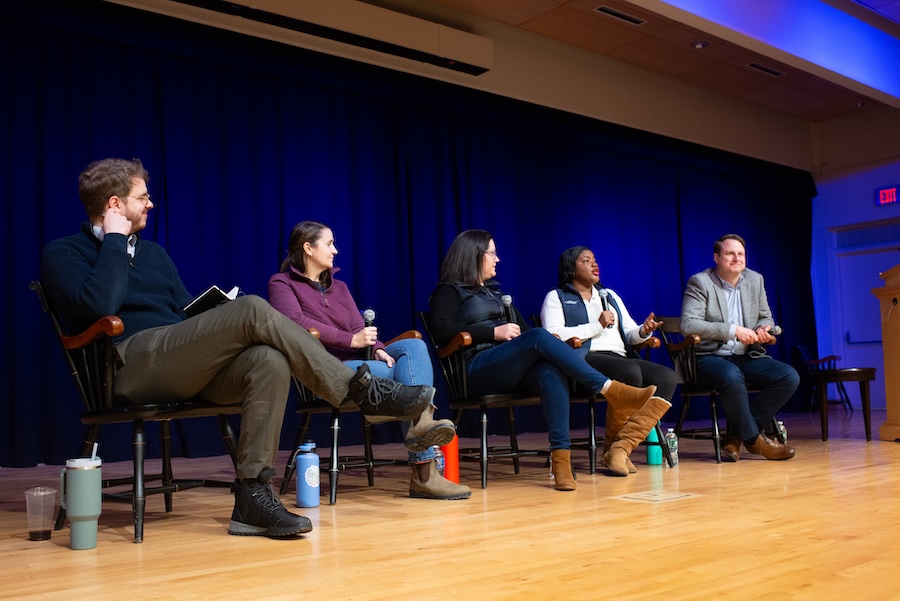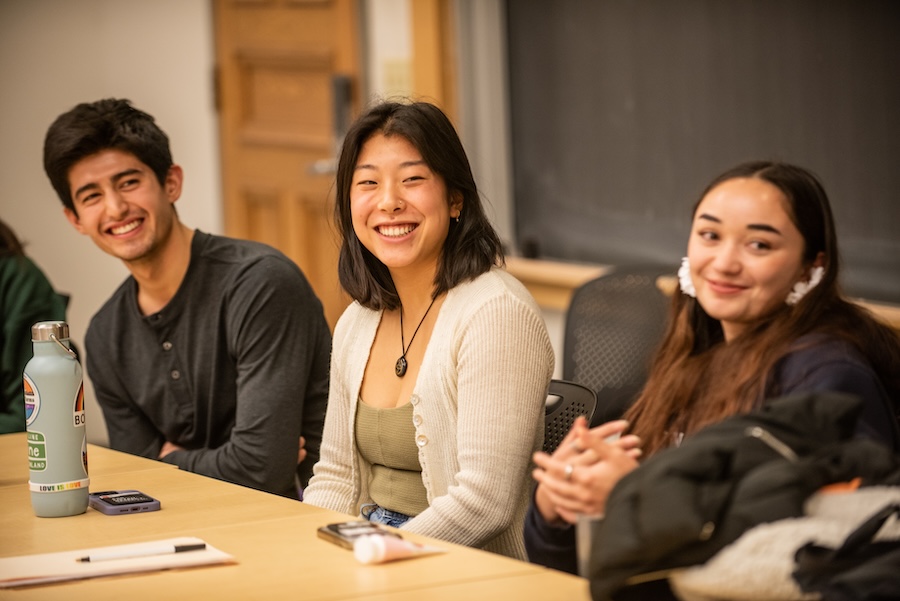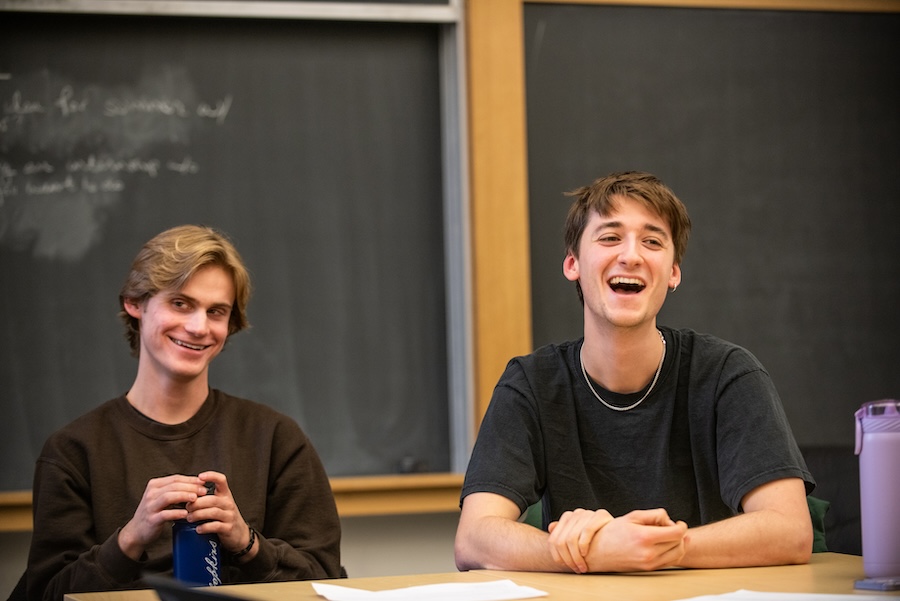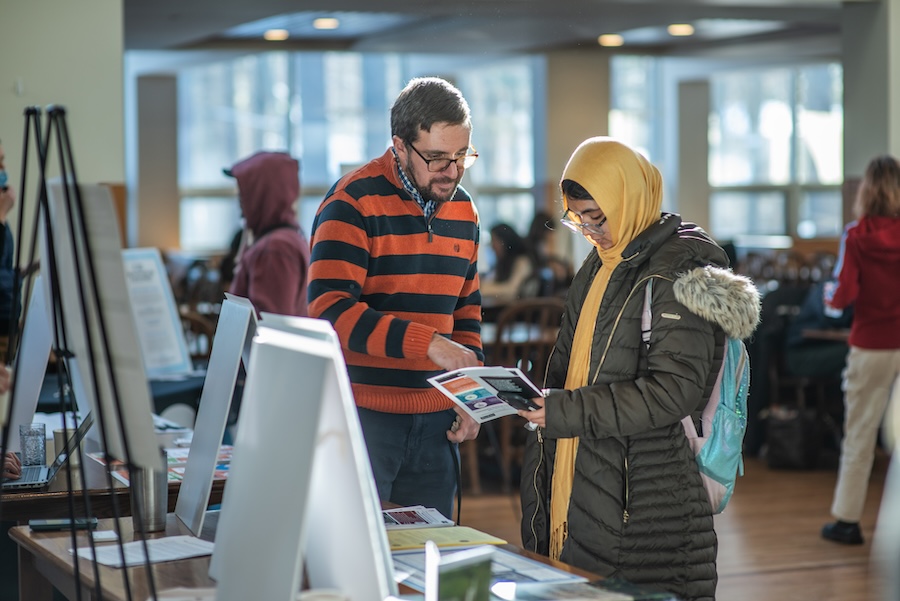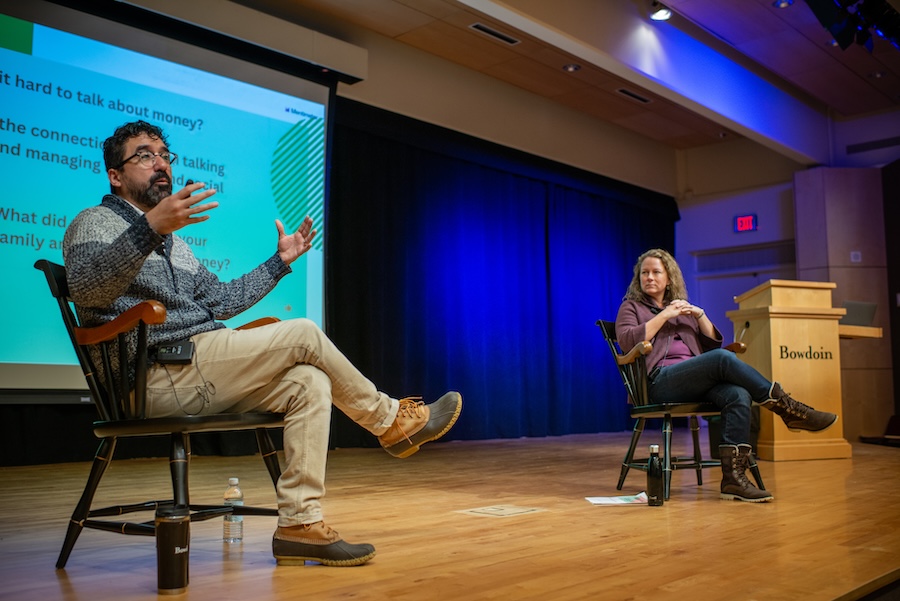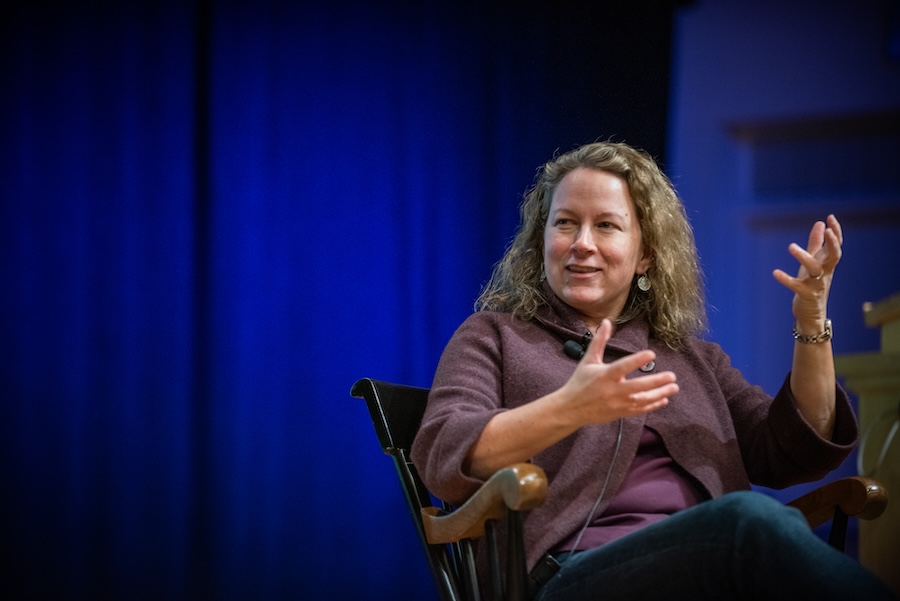Sophomore Bootcamp: Three Days of Honing Career Skills and Exploring Possible Futures
By Bowdoin News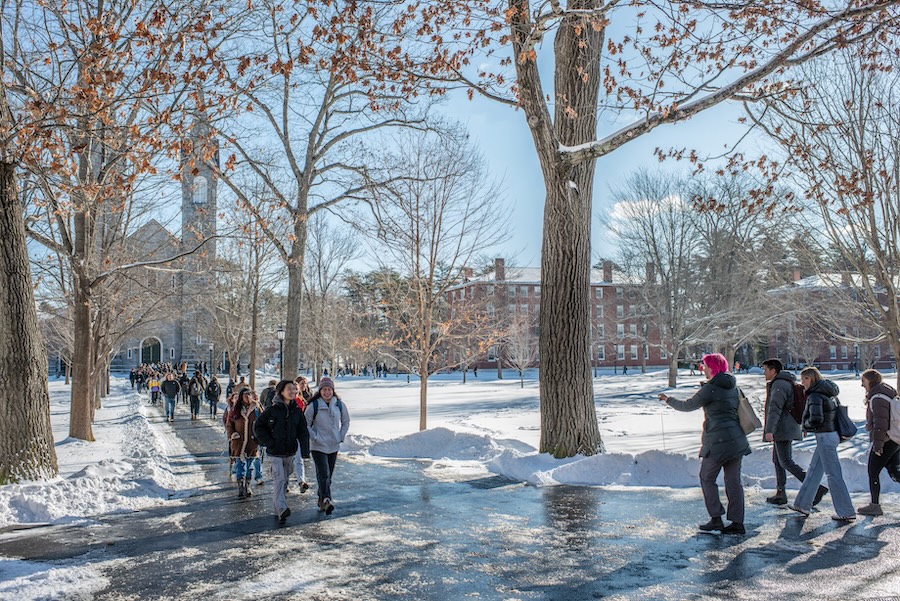
The Class of 2026 returned early to Bowdoin to attend Sophomore Bootcamp (CXD), an intensive workshop offered each year by Career Exploration and Development. It's not an understatement to say Bootcamp covers almost every angle of the internship- and job-seeking process.
Bethany Walsh, CXD's senior associate director of skill development and programming, oversees the monumental task of organizing and running Bootcamp, ushering 501 sophomores through the experience. This year she was helped by the entire CXD staff, forty Bowdoin staff and friends, forty-four trained upperclass career leaders/coaches, and 439 volunteer alumni.
Most of the alumni participate in one-on-one networking calls with students. A few travel to campus to meet with students, including for a favorite annual event, the “Alumni Panel: Common Good & the Good Life.” (See details below.)
“We aim, at CXD, to help you live a satisfying life—not just to get a good job, but to build a life that you want. ”
—Bethany Walsh, CXD senior associate director











President Safa Zaki also made a point of checking in. After joining a table of students in Thorne Dining Hall on Thursday evening to share an elegant meal, she offered a few remarks to the assembled group.
“I think it’s a wonderful idea to set aside this time and space” to learn from alumni, develop specific skills, “and to think through the ways that your interests, your values, your passions, and your experiences fit in with your career goals," she said. "That’s key, that is part of what makes this program so incredible.”
She reinforced the accessible network of Bowdoin staff, faculty, and alumni—as well as the broader community of family members and friends—who are eager to assist students. “One of the goals of this program is to make sure you know that there are a lot of people and resources available to help you in what is likely going to be an ongoing process of career exploration and development, both while you are at Bowdoin and for many years to come,” she said.
“This is something I believe deeply: You will be well-prepared for [your career] journey...Workplaces are about to shift with AI...We’ll see jobs that don’t exist, and some of the ones we’re thinking about right now are going to look very different. But I believe the kind of education you’re getting here at Bowdoin puts you in a really good place for the changing world.”
—President Safa Zaki
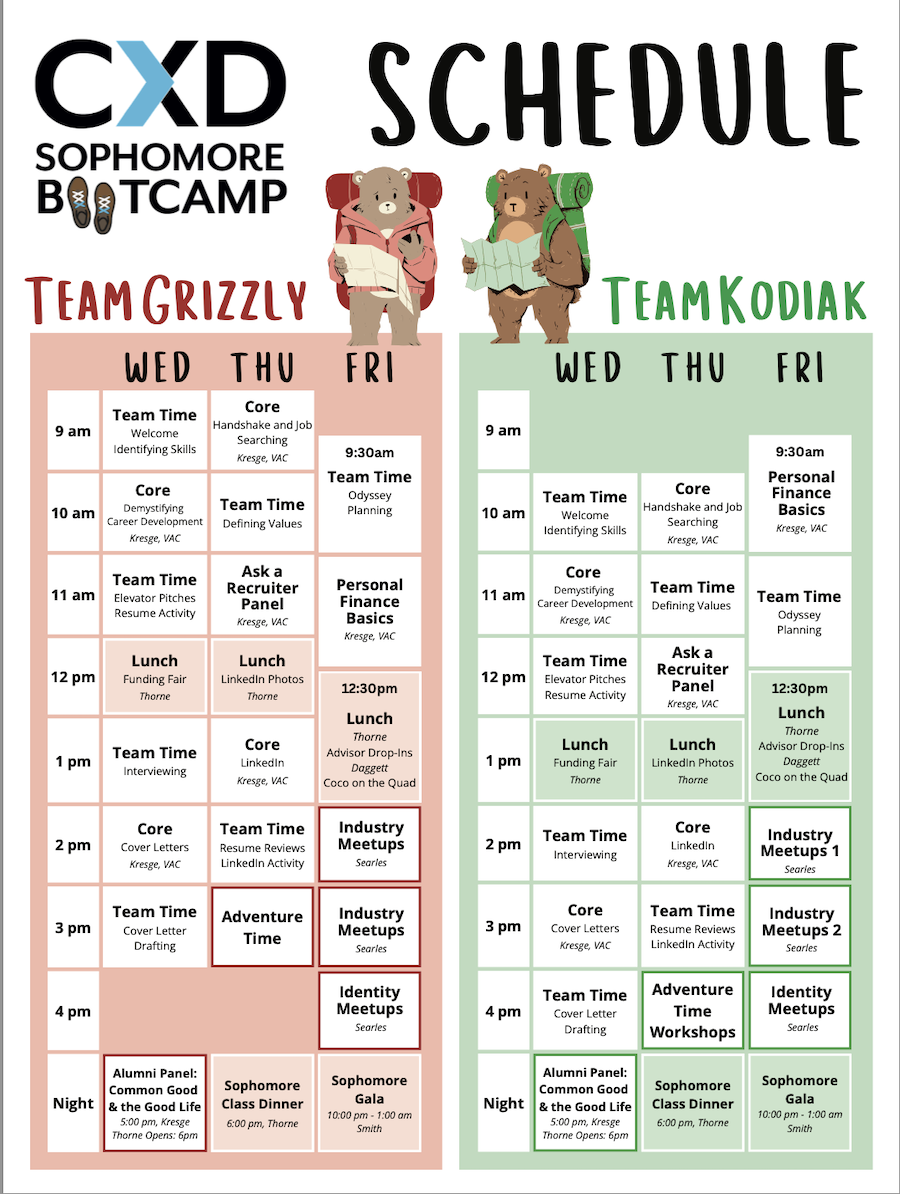
Adventuring through AI
Each year, Walsh and her team tweak the Bootcamp curriculum and update its offerings to meet student needs. One of the biggest adjustments this year was to emphasize artificial intelligence (AI) throughout the program, raising students' awareness of the ways in which the technology can help or derail job and internship prospects.
In the past year, as tools like Google Bard, ChatGPT, and perplexity.ai have been rolled out to the public, Walsh said employers' use of of the technology for hiring has accelerated, including screening out potential candidates who turn in AI-generated applications. "Employers are experimenting with AI, and students can also experiment with AI," she said. "We want to show where the tool can be most helpful and benefit them, and where it won't benefit them."
While CXD advisors addressed AI in many of the Bootcamp trainings, Walsh and CXD Assistant Director of Skills Programming and Operations Leah Hodder-Romano co-taught a focused Adventure Time workshop specifically dedicated to "Using AI in Your Job Search."
(Throughout Bootcamp, sophomores attend all-group sessions and smaller workshops; many of the latter allow for more personalized assistance with reflection, resumes, cover letters, etc. While some events require everyone's attendance, other parts of the program—including Adventure Time workshops—offer students the chance to select narrower topics to explore.)
When it comes to drafting a cover letter to potential employers, don’t be afraid to use artificial intelligence tools such as ChatGPT. That was some of the advice from Lisa Noble, senior associate director at CXD, during a core Bootcamp presentation focused on this critical element of many job applications.
“AI is our friend,” she said, and we should learn to “play with it and bend it to our will.” Noble described how she recently entered one of her students’ resumes into an AI tool to generate part of a usable cover letter. “I grabbed two bullets from her resume,” she explained, “and then told ChatGPT to write a concise paragraph of three to four sentences providing evidence of [her] strengths as a technical problem solver,” said Noble, who is also the CXD’s advisor for finance and consulting. You may have to do some editing afterward, she said, but nevertheless AI can make life a little easier.
Noble also urged students to work with each other when crafting cover letters. “This is a team sport.” Bowdoin students, she observed, often have a tendency to be overly modest. “So, you need another person to help you draw out the stories you perhaps don't think are that impressive, but actually ARE.”
In her AI workshop, Walsh began by giving an overview of available tools before zeroing in on tactics students can wield to make the technology generate effective results.
For instance, instead of asking AI to spit out cover letters or introductory notes—which will likely produce canned prose that is cliched and impersonal—students should "think about AI as fancy Google, as a research tool," Walsh said.
She demonstrated several specific ways of using AI to do research in mere seconds:
- Finding organizations: Perhaps you admire a specific nonprofit or business. You can ask AI to generate a list of other similar organizations, perhaps in a specific location.
- Differentiating between companies: Maybe you have received job offers from two businesses. You can ask AI to describe the difference between them, getting as specific as finding which one values work-life balance more.
- Finding the perfect job: After describing yourself, your interests, your areas of expertise, and your skills, you can ask AI to generate a list of suitable jobs.
- Salaries: Request that AI tell you entry-level salaries for specific jobs, as well as to name, say, twenty companies that hire this type of worker, even right out of college.
- Cover letter, resumes, and interviews: You can ask AI to tell you which skills you should highlight in your cover letter, to make your resume more succinct and to generate sample interview questions for a specific company or job.
- LinkedIn: Although in general AI is lousy at replacing a human's writing voice, it can help you get started on crafting a snappy 300-word query on LinkedIn. By pasting your own profile with the profile of a person you want to contact, it can drum up a targeted and polished note.
- Apartments: Maybe you are moving to a new city and need to find a place to live. AI can find apartments listed for under a certain amount of rent within twenty minutes of a metropolis.
After explaining these potential uses, Walsh added a warning: “This is just a first step.” She then broke down the pitfalls of AI, particularly concerning accuracy, bias, and confidentiality.
First, she explained, students should always verify any information before assuming it is correct or up to date. Second, she said, stay alert to possible bias in answers. AI is also only as intelligent as the potentially flawed human-created information it mines. Walsh also told students to never enter personal information into AI. (So if you are asking it to review a resume, remove the top portion including your name, address, and telephone number. Also, if possible, opt out of letting AI instruments use your queries for training models.)
At the conclusion of the one-hour workshop, Aniqa Chowdhury ’26 said, “That exceeded my expectations! I mean, you can look for housing, jobs, advice on jobs—tons of things.”
The workshop, Chowdhury continued, helped demystify AI and also made her feel less worried about using it in certain contexts. After hearing a lot from others about its dangers, she was relieved that the message from CXD was, “Use it! It helps with career goals,” she said.
However, she clarified, she would never rely on it for her own research or writing. “I want to keep the brain sharp!” she said with a smile.
Snapshots of Sophomore Bootcamp 2024.
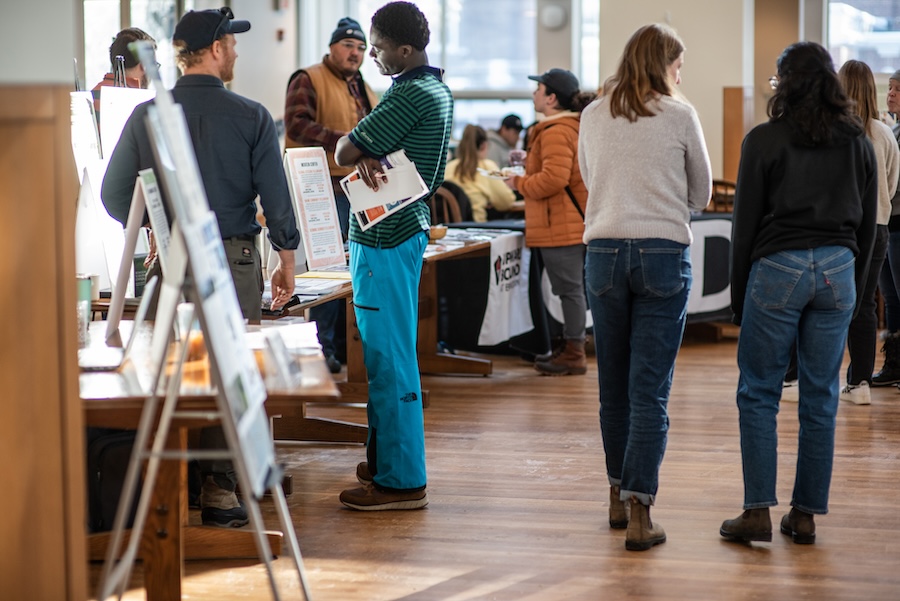
Funding Fair
As sophomores gathered in Thorne for lunch on the first day of Bootcamp, they were invited to a summertime funding fair. Bowdoin staff from the McKeen Center, Environmental Studies program, CXD, and Office of Student Fellowships and Research answered questions about grants to support internships, projects, and research.
We asked a few students browsing the fair's opportunities to find out what they would do if they received one of these grants.
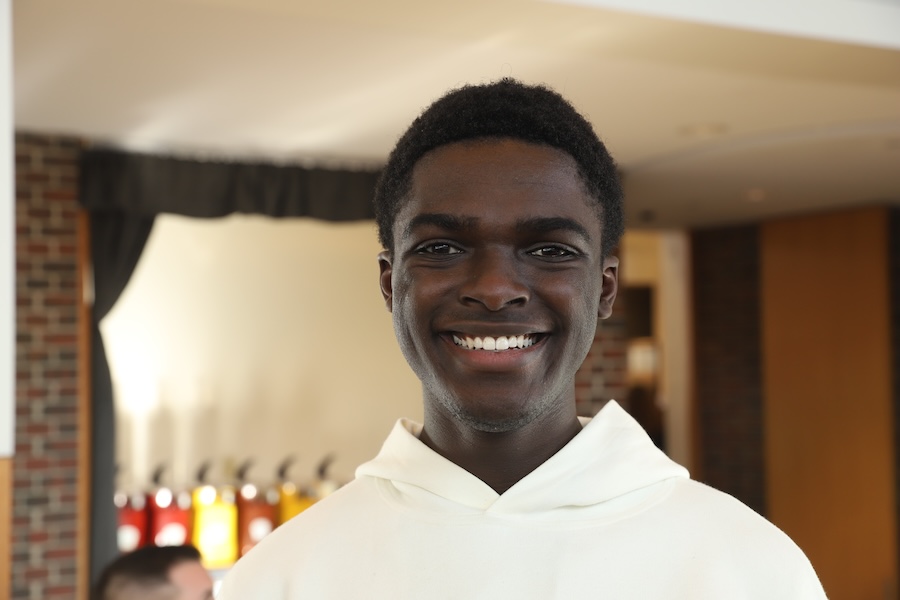


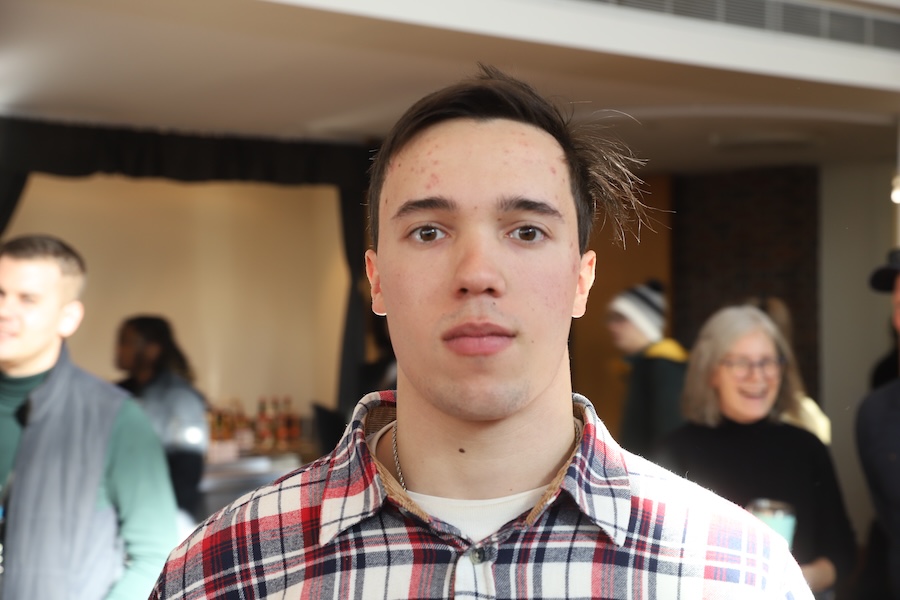



A Network of Cheering Alumni
In Zaki's remarks to the sophomore class, she marveled at the many alumni she has met who have told her they would like to aid students as they head down their career paths.
“I know that a lot of people out there are cheering for you,” she said. Just recently, on her travels to California, she said met scores of graduates who made it “abundantly clear...that they are deeply interested in you.”
“So many of them have said to me that they want you to know that you should feel comfortable reaching out for their help,” she continued. “I think you’ve seen, even at last night’s alumni panel, the generosity of some of our alumni and their willingness to connect.”
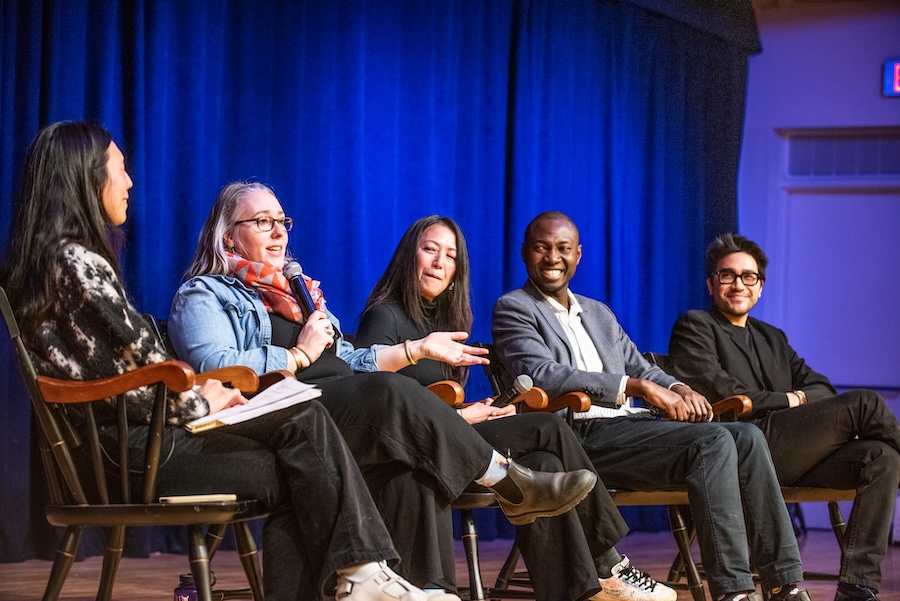
The panel was focused on carving out a “good life” while contributing to the common good, and was moderated by New York Times Pulitzer prize-winning reporter and Bowdoin trustee Katie Benner ’99.
Several themes emerged from the conversation, including alumni's mid-career shifts and reassessments as they searched for purpose and fulfillment.
Joe Adu ’07, Bowdoin trustee and senior IT executive in digital health sector
On not becoming a doctor and choosing another way to give back: “Since my childhood, I always knew that I was destined to be a doctor or in some medical profession where I could help people get better when they got sick…That ultimately led to my coming to Bowdoin.”
However, “When I came to Boston I discovered the psychology major...and really just loved the subject. I also did some work with the IT department as a student and that's when I discovered that technology was a field that I could possibly have a career in, and I started to really think about how I could help people—but in other ways.”
Chris Omachi ’12, Audible executive
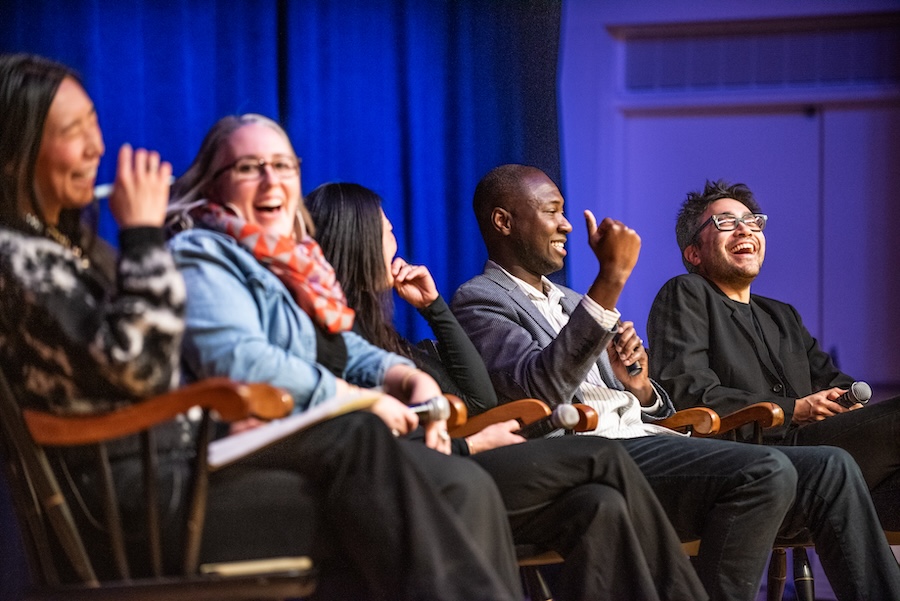
On not being afraid to try something new: An art history major, Omachi previously worked in the art sector. “I was starting to fear after a couple years that I didn't love it...So I knew I had to try something totally different. I used the Bowdoin network to get a job at HBO and from there I went back and forth quite a bit between the art world and the tech/entertainment world. Don’t be afraid to change jobs and leave a job. Not being afraid to try new things was something I learned.”
Mai Le ’00, former World Bank executive, current author and tech entrepreneur
On her own career jump and not being defined by her job: “I had studied so hard to get where I was: working at the World Bank, meeting presidents and executives. It was glamorous, but I wasn’t satisfied. I didn’t feel like I was having an impact.”
Now she is CEO and co-founder of Haystack Dx, a medical device start-up, but this isn’t all she does. “I write poetry, which I read out at different libraries. I wrote a book. I'm writing a screenplay that's being pitched in Hollywood. I lead different organizations. I'm helping an African organization fundraiser,” [the list goes on]. “And then I have my day job and three children. So yeah, I'm not defined by what I do.”
Bree Candland ’01, Award-winning teacher in Maine, now in her twenty-third year of teaching
On knowing her impact: “Ultimately, what I value about being a public school teacher is the relationships that we have with students. That's what you [students] give to the teachers and educators in your life—you make it worth it to show up in the morning, so that's really important. I can tangibly see my impact on the world around me all the time. It's like the easiest job to know that it matters.”
Photos by Michele Stapleton.
